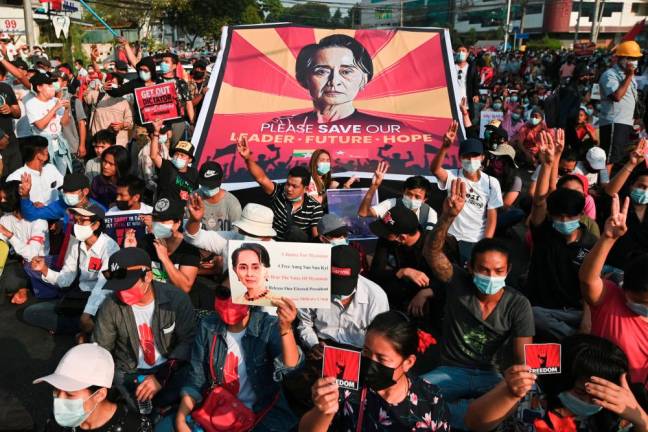UN warns Myanmar as internet is restored after blackout
The United Nations has warned the Myanmar military of “severe consequences” if it responds harshly to the protests that have taken place across the country following the February 1 coup, as a second internet blackout was lifted early on Tuesday.
“Ms Schraner Burgener has reinforced that the right of peaceful assembly must fully be respected and that demonstrators are not subjected to reprisals,” UN spokesman Farhan Haq said in New York.
“She has conveyed to the Myanmar military that the world is watching closely, and any form of heavy-handed response is likely to have severe consequences.”
In an account of the meeting, Myanmar’s army said Soe Win, the regime’s second in command, had discussed the administration’s plans and information on “the true situation of what’s happening in Myanmar”.
Myanmar was plunged into a second internet blackout on Monday night after the 10th day of demonstrations against the coup and an increased presence of troops and military vehicles. Injuries were reported in Mandalay, the country’s second-biggest city, after police used force to break up a protest there.
Internet monitoring group NetBlocks said the blackout came into force at 1am local time (18:30 GMT) but that connectivity was restored eight hours later.
Small numbers of people again began gathering in Yangon, in a continuation of days-long protests demanding the military, who seized power on February 1, step down and free the country’s elected leaders including 75-year-old Aung San Suu Kyi. She has been charged with the illegal possession of walkie-talkies and is expected to appear in court by video-link on Wednesday.
The Assistance Association for Political Prisoners (AAPP), which is tracking detentions, expressed concern that the military could use the internet blackouts to “commit unjust activities including arbitrary arrests.”
A new cybersecurity bill, which would allow those in power to ban content they dislike, restrict internet providers and intercept data, is also under consideration.
Coup leader General Min Aung Hlaing told a junta meeting on Monday that authorities were trying to proceed softly, but warned: “Effective action will be taken against people who are harming the country, committing treason through violence.”
As well as the demonstrations in towns and cities, civil servants including doctors and teachers have gone on strike as part of a civil disobedience movement that has crippled many functions of government.
Aung San Suu Kyi’s party won a 2015 election and another on November 8 – by an even larger majority – but the military claimed the vote was fraudulent and used that complaint to justify its coup. The electoral commission has dismissed accusations of fraud.
Aung San Suu Kyi spent nearly 15 years under house arrest during the previous military regime.






